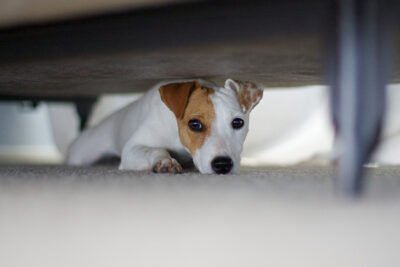The truth is that Labs are naturally curious and eager to explore their surroundings. They love being around other dogs, people, and even small animals like cats. But sometimes, they can get too involved in their exploration, and why does my Labrador hide? The curiosity behind this attitude brings about this article.
When a Labrador retriever shows signs of hiding in the house or yard, it may indicate separation anxiety or stress. This can happen when they’re nervous about something or reacting to something in their environment (like a new person or pet).
This is a common problem among Labs and other breeds of dogs raised as family pets rather than being trained as working dogs.
Labrador Retrievers could suffer separation anxiety if isolated from their family. At the same time, they were young. They then spent several years living in isolation before being adopted into another home or moved into a new neighborhood with few or no other dogs around them at all times (such as boarding kennels or dog training classes).
If this has happened to your Lab, you may notice that whenever you leave him alone for longer than fifteen minutes at a time, he becomes agitated and begins to hide under furniture or behind curtains until you return home from wherever you’ve gone.
Why Does My Labrador Hide?
Labrador Retrievers are the most popular dog breed in the United States. They have a friendly and outgoing personalities, but they may also be nervous and skittish around strangers.
They may hide because they feel scared, lonely, or stressed. Your dog may not want to be seen by strangers or other dogs. They may try to avoid being punished for something they’ve done wrong. They may want some alone time with you.
It’s important to remember that your dog is never intentionally hiding from you: they’re just doing their best to keep themselves safe and out of harm’s way. If you see them hiding, you mustn’t get angry with them, find them and make sure they’re OK.
Why is my dog hiding in the corner?

There are a few reasons your dog may be hiding in the corner, like separation anxiety, boredom, or health issues that need rest.
First, it could be because of separation anxiety. Dogs are pack animals and need to feel safe, so if you’re not home and your dog starts to feel alone or scared, it will want to be near you. A dog with separation anxiety may try to hide from their owner if it can’t find them.
Second, it could be because of boredom. Dogs tend to get bored when left alone for long periods, making them want to seek something new and exciting. They might also feel like they don’t have enough exercise if they’re left at home all day with nothing to do but sit around and worry about what’s going on outside their window.
Finally, it could just be because they’re sick. Suppose your dog is coughing or sneezing excessively and seems lethargic but still wants attention from you (or feels like running around). In that case, this could signify that they need some relaxation before continuing their activity and becoming sick.
Why do dogs hide when not well?
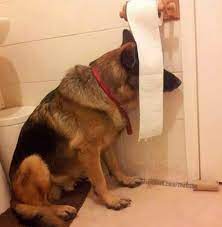
Dogs may hide when they’re not well because they’re looking for comfort and because they’re looking to avoid being scolded.
You might be worried about your dog’s health or well-being when you see your dog hiding under the bed or in another dark corner. But there are other reasons why dogs may hide when not well:
To seek comfort from their owners.
When your dog is sick or injured, it’s natural for them to want to hide out so they can feel safe and protected. They may also want to avoid being scolded by you if they don’t feel like themselves. They might even want to avoid getting into trouble with you.
To avoid being caught doing something wrong.
If your dog is sick and doesn’t want to get in trouble with its family members, it might naturally want to hide when no one is around. This is especially true if they’re sick and don’t want anyone catching them doing something terrible (like chewing on furniture).
Do labs like being under blankets?

Labs are one of the most popular dogs in the world, and that’s because they’re full of energy and love to play. That said, labs can get restless when they’re not having fun. They love being under blankets to feel safe, secure, and comfortable.
So if your Lab likes to be under blankets when he’s trying to sleep or relax, you might want to give him some extra comfort during these times. The best way to do this is using a fleece blanket or throw.
There are plenty of other ways to give your dog a warm place to snuggle up on those cold winter nights.
How do you coax a dog out of hiding?
A dog will respond to sound and movement, but you can also use a treat to get their attention. If you’re trying to coax a dog out of hiding, you’ll want to use something loud and startling.
A cough or sneeze might work, and it might be easier than sirens or horns. Try making a noise like that and then slowly move toward your dog. The trick is not to let them see you coming; you don’t want them running away before they realize what’s happening.
What are the signs of anxiety in dogs?
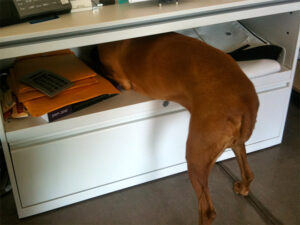
Anxiety is a feeling of uneasiness or worry about things people usually don’t get worried about. It can be caused by several factors, including stress and other mental health problems. Dogs may show signs of anxiety when they’re left alone in your home for long periods or when you have guests over for a party.
Signs of anxiety include:
Cowering
Cowering is a common sign of anxiety in dogs. Dogs often cower and hide when they are feeling anxious. This can be seen as a reaction to situations that cause them stress, such as loud noises or other everyday household events. The dog may also crouch down and lower its head, making it appear smaller than usual.
Barking excessively
Barking excessively is another sign of anxiety in dogs. Many dogs bark at something or someone if they feel fearful or unsure about what’s happening around them. If your dog is barking excessively, you should take note of the situation(s) that cause this reaction so that you can deal with them appropriately.
Panting heavily
Panting heavily is another common sign of anxiety in dogs. Panting is often a sign that your dog has just been running around frantically or has been startled by something new around them. It’s important to note whether or not your dog is panting heavily when they feel anxious—if it’s only after being startled by something new and unfamiliar
Shaking or trembling (like a leaf)
When a dog is anxious, it may shake its limbs constantly. They may also tremble violently. This can happen as soon as they sense danger, but it could also be triggered by other things like loud noises or sudden changes in temperature or humidity levels around them.
Whining or crying out
When a dog feels nervous or frightened, it can seem as if they’re crying out for help rather than trying to communicate verbally with us humans. They may also whine in an attempt to get attention from us humans or other dogs nearby who might be able to help them feel safe again.
Lying on the floor and refusing to get up
When your dog attempts to hide, it can signify that they feel anxious. Your dog may lie on the floor and refuse to get up when you approach or pet them, or they may even curl up into a ball and refuse to move. If you observe your dog doing this behavior repeatedly, talk to your vet about it.
Aggression
The dog may show signs of aggression, such as growling or snapping at others in the household (or even strangers).
Why is my dog suddenly avoiding me?
Just because your dog avoids you doesn’t mean he’s mad at you. It could be any number of reasons, from simple boredom to a medical condition.
If your dog is acting out of the blue, it’s essential to rule out anything that might be causing him distress. A quick search on Google as you check this write-up can help you determine whether your dog is suffering from a medical condition that could be causing him to withdraw or if he needs some time away from you.
Why is my dog acting strange and hiding?
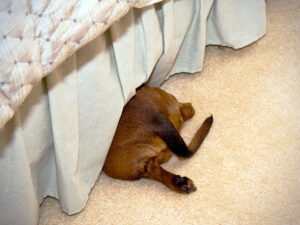
Your dog may be acting strange and hiding for several reasons, but fear is the most common.
It’s important to remember that dogs are incredibly social creatures who rely on their pack for protection, but sometimes it can be hard for them to adjust when a new family moves in or one of their members dies.
If you’re unsure why your dog is acting strange, try taking him outside and asking him to play with some toys or give him some affection. You might notice that he’ll react differently if you do this instead of trying to force him into behaving normally.
What breed of dog hides things?
There are a lot of dogs that hide things. Here’s a list of some of the most common: Labrador Retrievers, Terriers, Basset Hounds, Miniature Schnauzers, Dachshunds, Beagles, Great Danes, etc.
Labrador Retriever: They have a vast range of hiding spots, from underneath couches to under beds. They tend to make good pets for people who live in apartments because they’re not as likely to get into trouble with their neighbors.
Terriers: Terriers are small dogs great at finding their way around. They can fit in small spaces and hide things very well.
Basset Hounds: Basset Hounds are known for being very friendly, but they can also be very sneaky! They like to burrow under fences and up trees, so they make great hunting dogs because they’re good at finding their prey.
Miniature Schnauzers: Miniature Schnauzers are small dogs who love to curl up on laps! They like hiding places like pillows and blankets and will often keep them hidden in their beds so that no one else finds them.
Dachshunds: Dachshunds are famous for digging holes in gardens and filling them up again after you’ve watered your flowers! They’re also known for running around without shoes or socks on all day long (and not just when it’s
Why does my dog hide in the closet when I leave?
Your dog hides in the closet when you leave because they’re scared. When you go to the house, your dog may fear what might happen during your absence. They may feel threatened by the unknown, or they may have a fear of being alone.
If you notice your dog hiding in the closet when you leave, it’s essential to try and work out why they’re so fearful. If possible, identify any specific triggers that might cause this behavior.
You can also try taking steps to help alleviate their fear
Reduced stimulus (remove all potential threats.
Use positive reinforcement (give praise and treats for good behavior.
Provide reassurance that everything is OK (speak in calm tones
Why does my dog sit in the corner and stare at me?
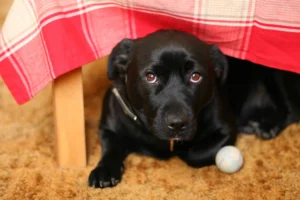
You’ve noticed that your dog sits in the corner and stares at you. This can be a sign of stress or anxiety, but there are other reasons your dog might do this.
One of the most common reasons dogs sit in the corner and stare at you is because they are trying to tell you something. Sometimes they’ll do this when they want attention or food, but it could also be because they’re nervous or uneasy.
Another reason your dog might sit in the corner and stare at you is that she feels threatened by people or other dogs around her. If she feels that way, she’ll probably try to get as far away from them as possible by sitting in one spot and staring at them from afar.
Some dogs do this when a known predator nearby, such as a cat or a giant dog than theirs, tries to intimidate them into submission through intimidation techniques like growling or snapping at their heels as they walk past them.
What does it mean when your dog wants to be alone?
When your dog wants to be alone, they feel uncomfortable or unsafe. If your dog is barking or whining when you or other people approach them, they may feel uneasy and want to be left alone. This could signify unease about something specific, like a new person coming to them for the first time.
It could also indicate that something is bothering them at home. A dog afraid of other dogs may need some space from them, either because they don’t like the smell of another dog or because they’re worried they will bite them.
Dogs that other animals have attacked may also feel threatened by any movement in their direction. If a threat seems imminent and imminent, your dog may become scared and want to retreat into a safe space (or even hide).
Do dogs hide when they are sick?
Dogs are often seen as very affectionate and loyal, but it can be challenging to see how they feel about us and our health.
Dogs can go through a lot of emotional changes when they’re sick. They may hide from their owners or even hide in a different room than usual. This doesn’t mean that dogs don’t want to be around you. It just means that they’re probably feeling scared or sad.
If you suspect your dog is hiding because it’s sick, try taking them out for a walk or playing in a safe area they’ll enjoy, maybe in the backyard or down by the lake. Take the time to read their body language so that you know what they’re thinking.
If they seem uncomfortable around people who aren’t sick, try asking them if they’re OK with people coming over and petting them while you’re at work.
Why is my dog suddenly isolating himself?
You might be worried that he’s suffering from mental stress or health issues. While it’s possible he’s been through a traumatic event; it’s also possible that he’s simply dealing with something that’s outside of his control.
If you’re not sure what to do, here are some things you can try:
- Take the dog for a walk around the block to release some pent-up emotions. If that doesn’t work and your dog still seems anxious, you may need to take him to the vet for a check-up.
- Try petting and whispering to him in a calm voice so he can hear your words without being overwhelmed (which could cause him to snap at you).
- Try giving him a treat every time he goes potty or eats food before bedtime, so he knows when it’s time for his meal/bath/exercise session.
Do dogs hide when they are in pain?
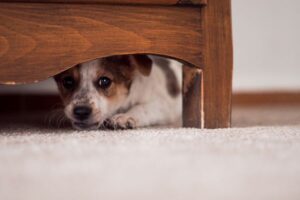
Dogs are very good at masking pain. It’s a survival instinct passed down to them from their wolf ancestors and helps them get through some tough times.
Dogs don’t always show signs of pain, but when they do, it can be readily apparent. Dogs hide their pain by becoming over-interested in sniffing around, licking their paws or other parts of their body, licking the ground repeatedly, and walking in circles without any real purpose.
You may notice your dog is hiding an injury if they’re off its regular schedule and don’t want to play as much as usual. If you see your dog limping or lying down on the floor with a painful look on its face, this could be a sign that they’re in pain.
What to do if your dog is hiding?
If you’re unsure what to do if your dog is hiding, we’ve got some tips for you.
First of all, make sure that there’s a good reason for them to be hiding. If they’ve been barking at the door, it’s likely because they want to go out and play with their friends. Hiding at the back of the couch isn’t going to get them any treats.
Next, try to coax them out by giving them a treat or a toy before you call them over. If that doesn’t work, try yelling their name until they come out of hiding.
Finally (and this might sound strange to say), if none of these things work and they’re still hiding, it might be time for some professional help.
Some dogs have anxiety disorders that can make it hard for them to play with other dogs in public places, and if your dog is one of those dogs, then you may need extra support from someone who knows how to help dogs like yours cope with their anxiety.
Conclusion
Why does my Labrador hide? Labrador Retrievers are incredibly affectionate, friendly dogs. They love to be around people and other animals and are huge fans of cuddling up in your lap while watching TV.
However, they do tend to be a little shy around strangers. Labrador Retrievers can also be a little more aloof than other breeds, so they may not always want to meet new dogs or people in the park.
If you notice that your Lab is hiding when it’s time for him to play with another dog or meet a new person at the park, don’t worry. It’s perfectly normal for Labs to be shy around new people and animals, but there are some things you can do so he doesn’t feel so uncomfortable around new situations.
First, high-energy dogs like Labs need lots of physical exercises daily to burn off excess energy before socializing with other dogs or people. Ensure your dog has plenty of opportunities to go on walks or play fetch to burn off some extra energy.
Another way you can ensure your dog feels comfortable meeting new people or dogs is by ensuring the situation is safe for him if there’s any chance that something could happen.

